- Home
- Charles Bukowski
The Days Run Away Like Wild Horses Page 3
The Days Run Away Like Wild Horses Read online
Page 3
and the cat-sides of the room
come in upon me
and I would scream,
but they have places for people
who scream;
and the cat walks
the cat walks forever
in my brain.
ants crawl my drunken arms
O ants crawl my drunken arms
and they let Van Gogh sit in a cornfield
and take Life out of the world with a
shotgun,
ants crawl my drunken arms
and they set Rimbaud
to running guns and looking under rocks
for gold,
O ants crawl my drunken arms,
they put Pound in a nuthouse
and made Crane jump into the sea
in his pajamas,
ants, ants crawl my drunken arms
as our schoolboys scream for Willie Mays
instead of Bach,
ants crawl my drunken arms
through the drink I reach
for surfboards and sinks, for sunflowers
and the typewriter falls like a heart-attack
from the table
or a dead Sunday bull,
and the ants crawl into my mouth
and down my throat,
I wash them down with wine
and pull up the shades
and they are on the screen
and on the streets
climbing church towers
and into tire casings
looking for something else
to eat.
a literary discussion
Markov claims I am trying
to stab his soul
but I’d prefer his wife.
I put my feet on the coffee table
and he says,
I don’t mind you putting
your feet on the coffee table
except that the legs are wobbly
and the thing
will fall apart
any minute.
I leave my feet on the table
but I’d prefer his wife.
I would rather, says Markov,
entertain a ditch-digger
or a newsvendor
because they are kind enough
to observe the decencies
even though
they don’t know
Rimbaud from rat poison.
my empty beercan
rolls to the floor.
that I must die
bothers me less than
a straw, says Markov,
my part of the game
is that I must live
the best I can.
I grab his wife as she walks by,
and then her can is against my belly,
and she has fine knees and breasts
and I kiss her.
it is not so bad, being old, he says,
a calmness sets in, but here’s the catch:
to keep calmness and deadness
separate; never to look upon youth
as inferior because you are old,
never to look upon age as wisdom
because you have experience. a
man can be old and a fool—
many are, a man can be young
and wise—few are. a—
for Christ’s all sake, I wailed,
shut up!
he walked over and got his cane and
walked out.
you’ve hurt his feelings, she said,
he thinks you are a great poet.
he’s too slick for me, I said,
he’s too wise.
I had one of her breasts out.
it was a monstrous
beautiful
thing.
watermelon
and the windows opened that night,
a ceiling dripped the sweat
of a tin god,
and I sat eating a watermelon,
all false red,
water like slow running of rusty
tears,
and I spit out seeds
and swallowed seeds,
and I kept thinking
I am a fool
I am a fool
to eat this watermelon,
but I kept eating
anyhow.
for one I knew
Of all the iron beds in paradise
yours was the most cruel
and I was smoke in your mirror
and you sluiced your hair with jade,
but you were a woman and I was a
boy, but boy enough for an iron bed
and man enough for wine
and you.
now I am a man,
man enough for all,
and you are, you
are
old
not now so cruel,
now your iron bed
is empty.
when Hugo Wolf went mad–
Hugo Wolf went mad while eating an onion
and writing his 253rd song; it was rainy
April and the worms came out of the ground
humming Tannhäuser, and he spilled his milk
with his ink, and his blood fell out to the walls
and he howled and he roared and he screamed, and
downstairs
his landlady said, I knew it, that rotten son
of a
bitch has dummied up his brain, he’s jacked-off
his last piece
of music and now I’ll never get the rent, and someday
he’ll be famous
and they’ll bury him in the rain, but right now
I wish he’d shut
up that god damned screaming—for my money he’s
a silly pansy jackass
and when they move him out of here, I hope they
move in a good solid fisherman
or a hangman
or a seller of
Biblical tracts.
riot
the reason for the riot was we kept getting beans
and a guard grabbed a colored boy who threw his on the floor
and somebody touched a button
and everybody was grabbing everybody;
I clubbed my best friend behind the ear
somebody threw coffee in my face
(what the hell, you couldn’t drink it)
and I got out to the yard
and I heard the guns going
and it seemed like every con had a knife but me,
and all I could do was pray and run
and I didn’t have a god and was fat from playing
poker for pennies with my cellmate,
and the warden’s voice started coming over the cans,
and I heard later, in the confusion,
the cook raped a sailor,
and I lost my shaving cream, a pack of smokes
and a copy of The New Yorker;
also 3 men were shot,
a half dozen knifed,
35 put in the hole,
all yard privileges suspended,
the screws as jittery as L.A. bookies,
the prison radio off,
real quiet,
visitors sent home,
but the next morning
we did get our mail—
a letter from St. Louis:
Dear Charles, I am sorry you are in prison,
but you cannot break the law,
and there was a pressed carnation,
perfume, the looming of outside,
kisses and panties,
laughter and beer,
and that night for dinner
they marched us all back down
to the beans.
meanwhile
neither does this mean
the dead are
at the door
begging bread
before
the stockpiles
blow
like all the
storms and hell
in one big love,
but anyhow
I rented a 6 dollar a week
room
in Chinatown
with a window as large as the
side of the world
filled with night flies and neon,
lighted like Broadway
to frighten away rats,
and I walked into a bar and sat down,
and the Chinaman looked at my rags
and said
no credit
and I pulled out a hundred dollar bill
and asked for a cup of Confucius juice
and 2 China dolls with slits of eyes
just about the size of the rest of them
slid closer
and we sat
and we
waited.
a poem is a city
a poem is a city filled with streets and sewers
filled with saints, heroes, beggars, madmen,
filled with banality and booze,
filled with rain and thunder and periods of
drought, a poem is a city at war,
a poem is a city asking a clock why,
a poem is a city burning,
a poem is a city under guns
its barbershops filled with cynical drunks,
a poem is a city where God rides naked
through the streets like Lady Godiva,
where dogs bark at night, and chase away
the flag; a poem is a city of poets,
most of them quite similar
and envious and bitter…
a poem is this city now,
50 miles from nowhere,
9:09 in the morning,
the taste of liquor and cigarettes,
no police, no lovers, walking the streets,
this poem, this city, closing its doors,
barricaded, almost empty,
mournful without tears, aging without pity,
the hardrock mountains,
the ocean like a lavender flame,
a moon destitute of greatness,
a small music from broken windows…
a poem is a city, a poem is a nation,
a poem is the world…
and now I stick this under glass
for the mad editor’s scrutiny,
and night is elsewhere
and faint gray ladies stand in line,
dog follows dog to estuary,
the trumpets bring on gallows
as small men rant at things
they cannot do.
the cat
the hunter goes by my window
4 feet locked in the bright stillness of a
yellow and blue
night.
cruel strangeness takes hold in wars, in
gardens—
the yellow and blue night explodes before
me, atomic, surgical,
full of starlit
devils…
then the cat leaps up on the
fence, a tubby dismay,
stupid, lonely,
whiskers like an old lady in the
supermarket
and naked as the
moon.
I am temporarily
delighted.
hermit in the city
Idle in the forest of my room
with tungsten trees, owl boiling coffee,
webs cowled in gold over windows
staring outward into hell;
cigarette breath: statues of perfection,
not stuffed or whirled in cancers
of ranting;
engines and wheels crawl to gaseous
ends along the sabre-tooth;
my trees climb with monkey-rhyme,
climb out through the ceiling
breaking TV antennas and
the dull howl of canned laughter,
canned humor, canned death;
idle, idle in this forest,
calla lilies, grass, stone,
all nighttime level peace
of no bombers or faces,
and I dream the stone dream,
the grass dream,
the river running through my
fingerbones
one hundred and fifty years away,
leaving shots of grit and gold
and radium,
lifted and turned
by dizzied fish
and dropped,
raising flecks of sand
in my sleep…
The owl spits his coffee,
my monkeys chit the gibberish plan,
and my walls,
my walls help endure the seizing.
II
I dreamed I drank an Arrow shirt
and stole a broken
pail
all-yellow flowers
through the venetian blinds I saw a fat man in a brown coat
(with a head I can only describe as like a marshmallow)
drag the casket from the hearse: it was battleship gray
with all-yellow flowers.
they put it on a roller that was hidden in purple drape
and the marshmallow-man and one pin-crisp bloodless woman
walked for him up the incline…and!—
gore-bell-horror-sheer-sheen-world-ending-moment!—
almost losing IT there, once—
I could see the body rolling out
like one loose dice in a losing game—the arms waving
windmills and legs kicking autumn footballs.
they made it into the church
and I remained outside
opening my brain to living sunlight.
in the room with me she was singing and rolling her
long golden hair. (this is true Arturo, and that is what
makes it so simple.)
“I just saw them take in a body,”
I fashioned to her.
it’s autumn, it’s trees, it’s telephone wires,
and she sings some song I can’t understand, some High Mass
of Life.
she went on singing but I wanted to die
I wanted yellow flowers like her golden hair
I wanted yellow-singing and the sun.
this is true, and that is what makes it so strange:
I wanted to be opened and untangled, and
tossed away.
what seems to be the trouble, gentlemen?
the service was bad
and the bellboy kept bringing in towels
at the wrong moment.
drunk, I finally clubbed him along
the side of the head.
he was a little man and he fell
like an October leaf,
quite done,
and when the fuzz came up
I had the sofa in front of the door
and the chain on,
the 2nd movement of Brahms’ First Symphony
and had my hand halfway up the ass
of a broad old enough to be my grandmother
and they broke the god damned door,
pushed the sofa aside;
I slapped the screaming chippy
and turned and asked,
what seems to be the trouble, gentlemen?
and some young kid who had never shaved
brought his stick down against my head
and in the morning I was in the prison ward
chained to my bed
and it was hot,
the sweat coming down through the white
senseless sheet,
and they asked all sorts of silly questions
and I knew I’d be late for work,
which worried me immensely.
spring swan
swans die in the Spring too
and there it floated
dead on a Sunday
sideways
circling in current
and I walked to the rotunda
and overhead
gods in chariots
dogs, women<
br />
circled,
and death
ran down my throat
like a mouse,
and I heard the people coming
with their picnic bags
and laughter,
and I felt guilty
for the swan
as if death
were a thing of shame
and like a fool
I walked away
and left them
my beautiful swan.
remains
things are good as I am not dead yet
and the rats move in the beercans,
the papersacks shuffle like small dogs,
and her photographs are stuck onto a painting
by a dead German and she too is dead
and it took 14 years to know her
and if they give me another 14
I will know her yet…
her photos stuck over the glass
neither move nor speak,
but I even have her voice on tape,
and she speaks some evenings,
her again
so real she laughs
says the thousand things,
the one thing I always ignored;
this will never leave me:
that I had love
and love died;
a photo and a piece of tape
is not much, I have learned late,
but give me 14 days or 14 years,
I will kill any man
who would touch or take
whatever’s left.
the moment of truth
he died a suicide in a Detroit hotel room
on skid row
and he was stiff when they found him,
rat poison…
I was managing the place then,

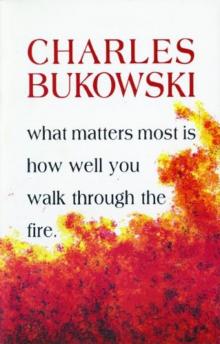 Burning in Water, Drowning in Flame
Burning in Water, Drowning in Flame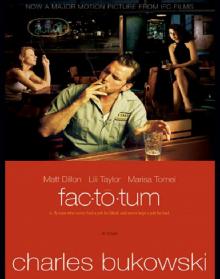 Factotum
Factotum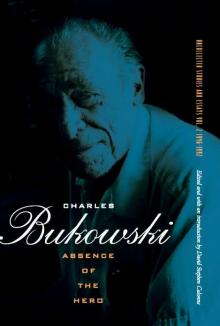 Absence of the Hero
Absence of the Hero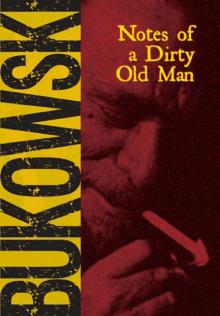 Notes of a Dirty Old Man
Notes of a Dirty Old Man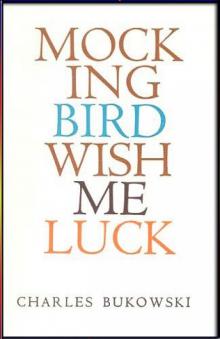 Mockingbird Wish Me Luck
Mockingbird Wish Me Luck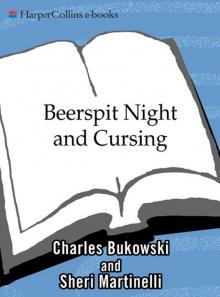 Beerspit Night and Cursing
Beerspit Night and Cursing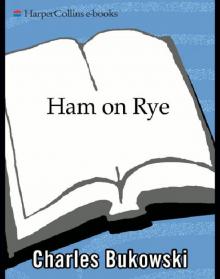 Ham on Rye: A Novel
Ham on Rye: A Novel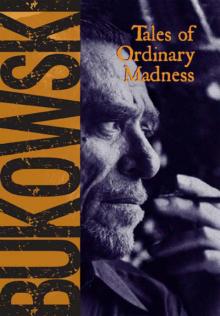 Tales of Ordinary Madness
Tales of Ordinary Madness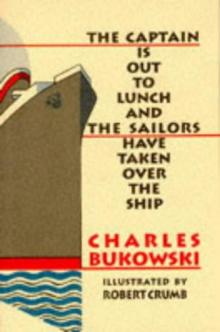 The Captain Is Out to Lunch and the Sailors Have Taken Over the Ship
The Captain Is Out to Lunch and the Sailors Have Taken Over the Ship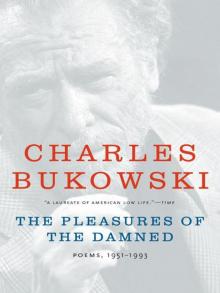 The Pleasures of the Damned
The Pleasures of the Damned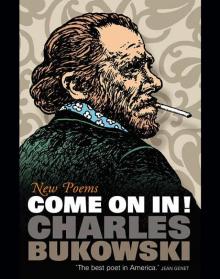 Come on In!
Come on In!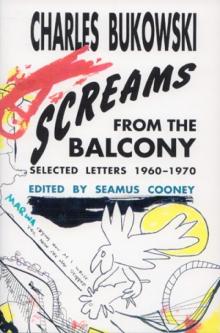 Screams From the Balcony
Screams From the Balcony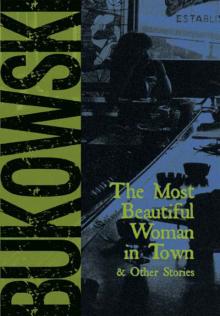 The Most Beautiful Woman in Town & Other Stories
The Most Beautiful Woman in Town & Other Stories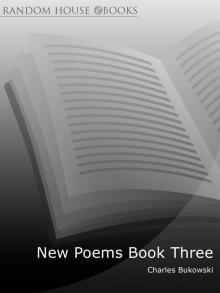 New Poems Book 3
New Poems Book 3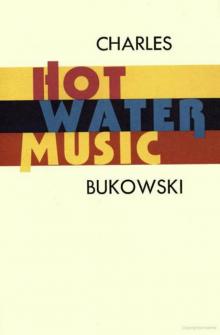 Hot Water Music
Hot Water Music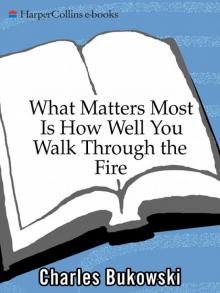 What Matters Most Is How Well You Walk Through the Fire
What Matters Most Is How Well You Walk Through the Fire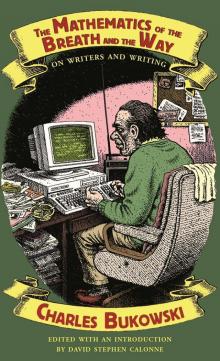 The Mathematics of the Breath and the Way
The Mathematics of the Breath and the Way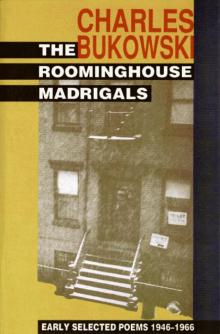 The Roominghouse Madrigals: Early Selected Poems, 1946-1966
The Roominghouse Madrigals: Early Selected Poems, 1946-1966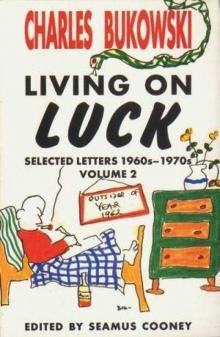 Living on Luck
Living on Luck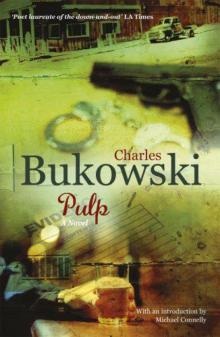 Pulp
Pulp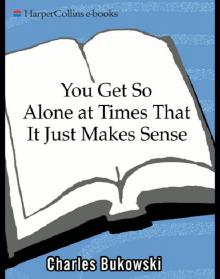 You Get So Alone at Times That It Just Makes Sense
You Get So Alone at Times That It Just Makes Sense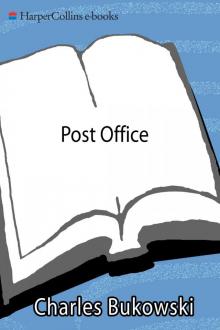 Post Office: A Novel
Post Office: A Novel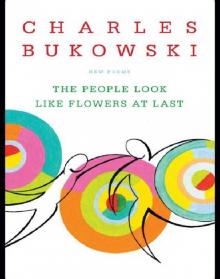 The People Look Like Flowers at Last: New Poems
The People Look Like Flowers at Last: New Poems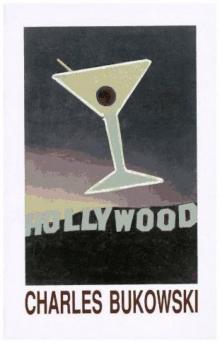 Hollywood
Hollywood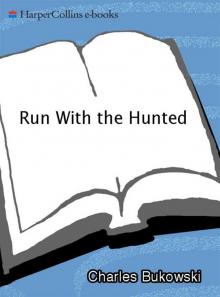 Run With the Hunted: A Charles Bukowski Reader
Run With the Hunted: A Charles Bukowski Reader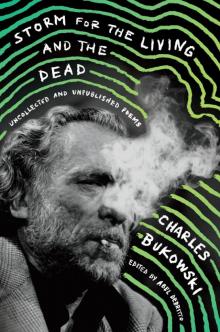 Storm for the Living and the Dead
Storm for the Living and the Dead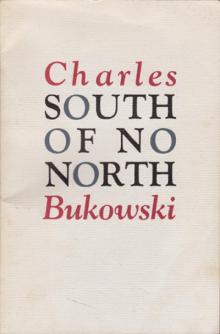 South of No North
South of No North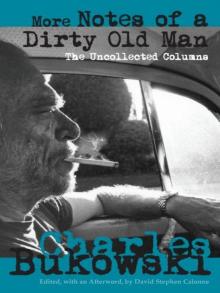 More Notes of a Dirty Old Man: The Uncollected Columns
More Notes of a Dirty Old Man: The Uncollected Columns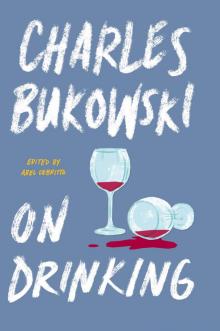 On Drinking
On Drinking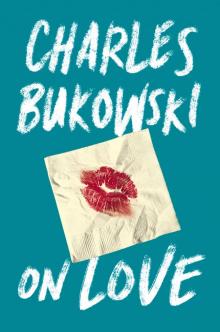 On Love
On Love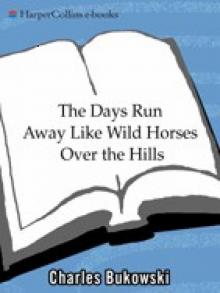 The Days Run Away Like Wild Horses
The Days Run Away Like Wild Horses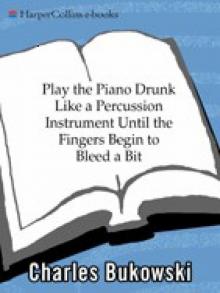 Play the Piano
Play the Piano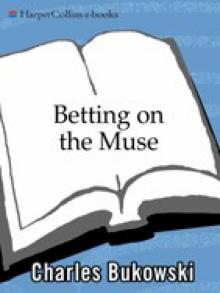 Betting on the Muse
Betting on the Muse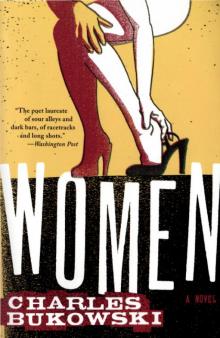 Women
Women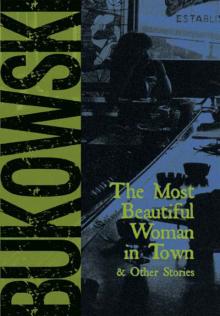 The Most Beautiful Woman in Town
The Most Beautiful Woman in Town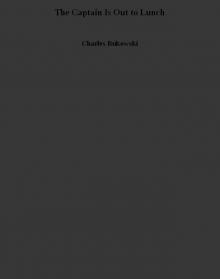 The Captain Is Out to Lunch
The Captain Is Out to Lunch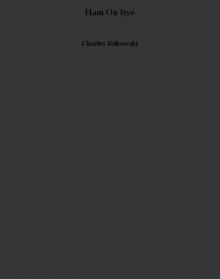 Ham On Rye
Ham On Rye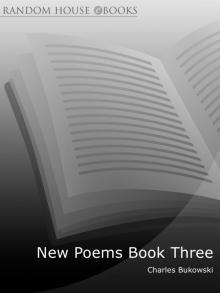 New Poems Book Three
New Poems Book Three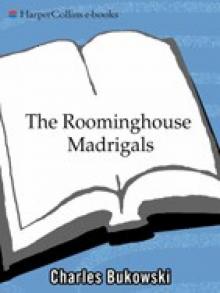 The Roominghouse Madrigals
The Roominghouse Madrigals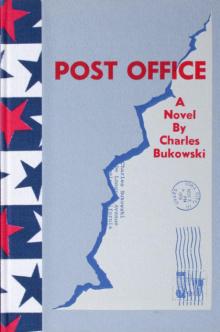 Post Office
Post Office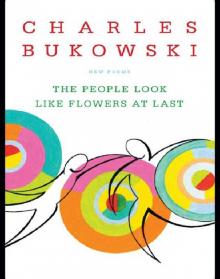 The People Look Like Flowers At Last
The People Look Like Flowers At Last